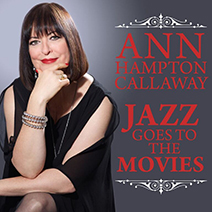Ann Hampton Callaway
Jazz Goes to the Movies
(Shanachie Records)
October 30, 2018
Reviewed by Alix Cohen for Cabaret Scenes
 This is a sophisticated jazz CD for those who like their martinis shaken not stirred. The music is often dancey, the scat harmonious, the instruments defer to one another.
This is a sophisticated jazz CD for those who like their martinis shaken not stirred. The music is often dancey, the scat harmonious, the instruments defer to one another.
https://theteacherpreneur.com/wp-content/languages/new/online-bibliography.html
Ann Hampton Callaway is home.
George and Ira Gershwin’s “’S Wonderful” (An American in Paris) is sssmoooth and smiley with finely wrought, lyrical scat. A swinging “Let’s Face the Music and Dance” (Irving Berlin; Follow the Fleet) arrives with thrum-thrum bass heartbeat and horn music in its bloodstream. The vocal stretches, turns, bends, and twirls.
“Blue Skies” (Berlin; The Jazz Singer) starts curiously tentative and sad-disbelieving? Then, whomp!, becomes up-tempo and joyful. No middle ground here. The number conjures quick-tap dancing in hat and spats and with a cane. Piano is playful. Expansive scat grins. (Callaway can do that.)
Unlike the usual breezy interpretation, “The Folks Who Live on the Hill” emerges languid as a morning stretch still in pjs. It’s as if the singer is willing it into existence. (Jerome Kern/Oscar Hammerstein II; High, Wide, and Handsome). “The Way You Look Tonight” (Kern/Dorothy Fields; Swing Time) arrives breathy and smitten, a slow dance where the couple barely moves. Sax is an old soul. Piano is caressed. Vocal adores, at last drifting down like a leaf.
During Hoagy Carmichael/Ned Washington’s “The Nearness of You,” (Romance in the Dark), Callaway holds notes as if savoring emotion, unwilling to let go of visions. “Right” quivers slightly. “Arms” has four syllables and a tail. A muted, mellow horn underpins. “I need no soft lights to enchant me” she sings, voice rising on “need” and “enchant” as if aiming heavenward.
The insouciant, jazz version of “As Time Goes By” (Herman Hupfeld; Casablanca) evokes a gigolo or gigolette. Fleet-fingered piano has an infectiously good time.
https://theteacherpreneur.com/wp-content/languages/new/research-paper-help.html
“How Little We Know” (Carmichael/Johnny Mercer; To Have and Have Not) enters as a charming mambo with gently tapped drums, while an up-speed, samba-like “From This Moment On” (Cole Porter; Kiss Me, Kate) is exultant as a kite broken free from hands. Callaway’s voice slip/slides with perfect control.
https://theteacherpreneur.com/wp-content/languages/new/help-writing-an-essay.html
When does this horn player breathe?!
“This Can’t Be Love” (Rodgers & Hart; Billy Rose’s Jumbo) and “Taking a Chance on Love” (Vernon Duke/John LaTouche/Ted Fetter; Cabin in the Sky ) are cool and bouncy, yet not with the usual ingénue point of view. Callaway’s interpretation has experience behind it. You can hear the difference. Instruments swing out or sashay in turn. She revels.
“Long Ago (and Far Away)” (Kern/Ira Gershwin; Cover Girl) follows as the night, the day. Callaway might just as well be singing “I can’t believe I’m so lucky! I’m afraid to breathe for fear you’ll disappear.” It’s lilting and loving with Cyd Charisse grace.
She’s accompanied by Ted Rosenthal (piano), Martin Wind (bass), Tim Horner (drums), and Jimmy Greene (tenor and soprano sax).





